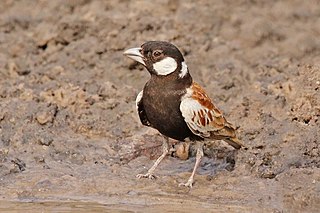
The horned lark or shore lark is a species of lark in the family Alaudidae found across the northern hemisphere. It is known as "horned lark" in North America and "shore lark" in Europe.

The calandra lark or European calandra-lark breeds in warm temperate countries around the Mediterranean and eastwards through Turkey into northern Iran and southern Russia. It is replaced further east by its relative, the bimaculated lark.

The bimaculated lark breeds in warm temperate countries eastwards from Turkey into Central Asia. It is the eastern counterpart of its relative, the calandra lark.

The crested lark is a species of lark widespread across Eurasia and northern Africa. It is a non-migratory bird, but can occasionally be found as a vagrant in Great Britain.

The greater short-toed lark is a small passerine bird. The current scientific name is from Ancient Greek. The genus name, Calandrella, is a diminutive of kalandros, the calandra lark, and brachydactila is from brakhus, "short", and daktulos, "toe".

The Mediterraneanshort-toed lark is a small passerine bird found in and around the Mediterranean Basin. It is a common bird with a very wide range from Canary Islands north to the Iberian Peninsula and east throughout North Africa to parts of the Middle East. The International Union for Conservation of Nature has rated its conservation status as being of "least concern".

The chestnut-backed sparrow-lark is a passerine bird which is a resident breeder in Africa south of the Sahara Desert.

Melanocorypha is a small genus of birds in the lark family. The current genus name, Melanocorypha is from Ancient Greek melas, "black", and koruphos a term used by ancient writer for a now unknown bird, but here confused with korudos, "lark".

The Cape clapper lark is a small passerine bird which breeds in southern Africa. It derives its name from the wing clapping which forms part of the display flight. The Cape clapper lark is a species of open grassland and savannah, also inhabiting karoo, fynbos and fallow agricultural land.

The eastern clapper lark is a small passerine bird which breeds in southern Africa. It derives its name from the wing clapping which forms part of its display flight.

The red-capped lark, Calandrella cinerea, is a small passerine bird. This lark breeds in the highlands of eastern Africa southwards from Ethiopia and Somaliland. In the south, its range stretches across the continent to Angola and south to the Cape in South Africa.

The sand lark is a small passerine bird in the lark family, Alaudidae, found in southern Asia. It is somewhat similar, but smaller than the short-toed larks.

The pink-breasted lark or pink-breasted bushlark is a species of passerine bird in the family Alaudidae.

The sabota lark is a species of lark in the family Alaudidae. It is found in southern Africa in its natural habitats of dry savannah, moist savannah, and subtropical or tropical dry shrubland.

Gray's lark is a species of lark in the family Alaudidae. It is found in south-western Africa in its natural habitat of hot deserts.

Hume's short-toed lark is a species of lark in the family Alaudidae. It is found in south-central Asia from Iran and Kazakhstan to China.

The Karoo lark should not be confused with the similarly named Karoo long-billed lark.

The dune lark is a species of lark in the family Alaudidae. It is endemic to Namibia where its natural habitat is subtropical or tropical dry lowland grassland.

The Mongolian lark is a species of lark in the family Alaudidae found from southern Russia and Mongolia to central China.

The Mongolian short-toed lark or Sykes's short-toed lark is a species of lark in the family Alaudidae. It breeds in China and Mongolia and winters in southern Asia.






















